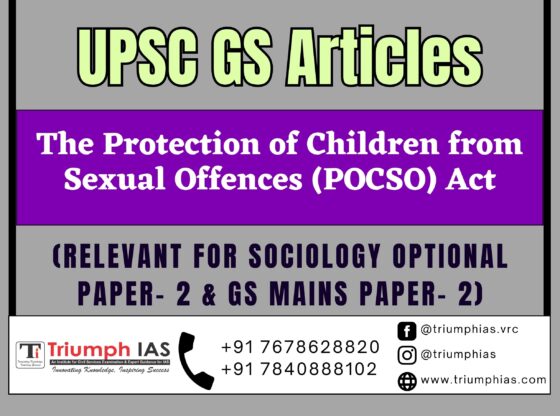The Protection of Children from Sexual Offences (POCSO) Act
Relevant for sociology optional Paper- 2 & GS Mains Paper- 2

The Protection of Children from Sexual Offences (POCSO) Act is a comprehensive legislation enacted in India in 2012, to address the growing concern of sexual offences against children. The Act aims to provide legal protection to children from sexual abuse, exploitation, and harassment. It covers a wide range of offences, including sexual assault, sexual harassment, and pornography involving children.
The POCSO Act defines a child as any person under the age of 18 years. It recognizes the vulnerability of children and the need for special protection measures to prevent sexual abuse and exploitation. The Act also recognizes the need for a child-friendly approach to the investigation, trial, and rehabilitation of child victims of sexual offences.
The POCSO Act makes it mandatory for anyone who has knowledge of a child being sexually abused to report it to the authorities. Failure to report such incidents can lead to imprisonment and fines. This provision is aimed at ensuring that incidents of sexual abuse are not swept under the rug and that perpetrators are brought to justice.
The Act also lays down stringent punishment for those who commit sexual offences against children. Depending on the severity of the offence, the punishment can range from imprisonment for a term of three years to life imprisonment. The Act also provides for the death penalty in cases of aggravated sexual assault against children.
In addition to providing legal protection to children, the POCSO Act also lays down guidelines for the investigation and trial of sexual offences against children. The Act requires that investigations be conducted by police officers who are specially trained to handle cases involving children. It also provides for the recording of statements of child victims in a child-friendly manner and allows for the presence of a parent or guardian during the recording of the statement.
The POCSO Act also lays down guidelines for the rehabilitation and protection of child victims of sexual offences. It recognizes that children who are victims of sexual abuse require special care and attention to help them cope with the trauma of the abuse. The Act provides for the establishment of special courts to deal with cases of sexual offences against children and for the appointment of special public prosecutors to handle these cases.
Despite the enactment of the POCSO Act, the issue of sexual offences against children continues to be a grave concern in India. According to the National Crime Records Bureau, there were more than 42,000 cases of sexual offences against children reported in India in 2019. This highlights the need for greater awareness about the Act and its provisions and for more effective implementation of the Act.
One of the key challenges in the implementation of the POCSO Act is the lack of awareness and sensitization among the general public and the law enforcement agencies. Many people are still unaware of the Act and its provisions, and this can lead to a lack of reporting of incidents of sexual abuse. There is also a need for greater training and sensitization of police officers and other officials who are involved in the investigation and trial of cases of sexual offences against children.
Another challenge is the lack of infrastructure and resources for the rehabilitation and protection of child victims of sexual offences. Many children who are victims of sexual abuse come from marginalized and vulnerable communities and require special care and attention. The government needs to allocate more resources towards the establishment of special homes and rehabilitation centers for these children.
In conclusion, the Protection of Children from Sexual Offences (POCSO) Act is a crucial legislation in India that provides legal protection to children from sexual abuse and exploitation. The Act recognizes the vulnerability of children and the need for special protection measures to prevent sexual offences. However, there is still a need for greater awareness about the Act and its provisions and for more effective implementation of the Act. By working together, we can create a safer and more secure environment for our children and ensure that they are protected from all forms of sexual abuse and exploitation.
For more such free UPSC notes, Articles, News & Views Join our Telegram Channel. https://t.me/triumphias
Click the link below to see the details about the UPSC – Civils courses offered by Triumph IAS. https://triumphias.com/pages-all-courses.php


